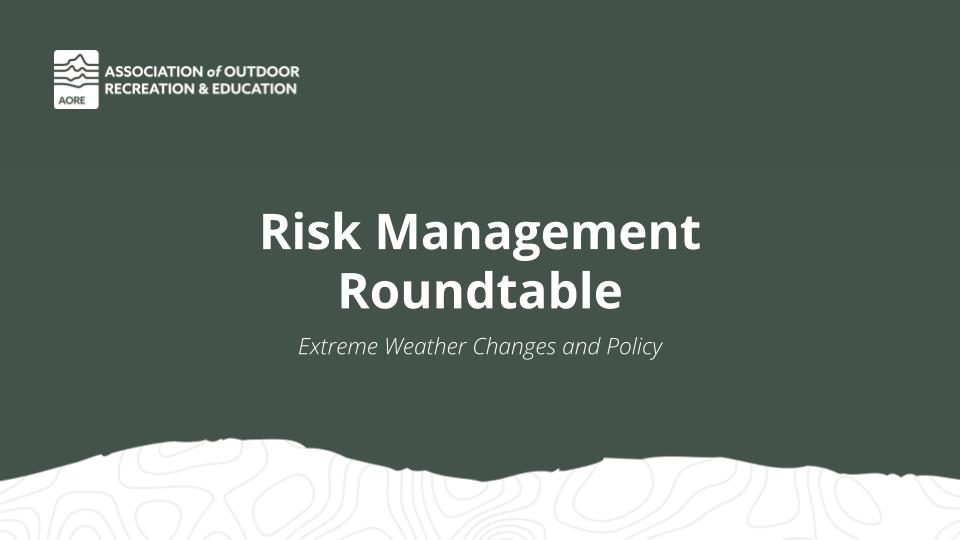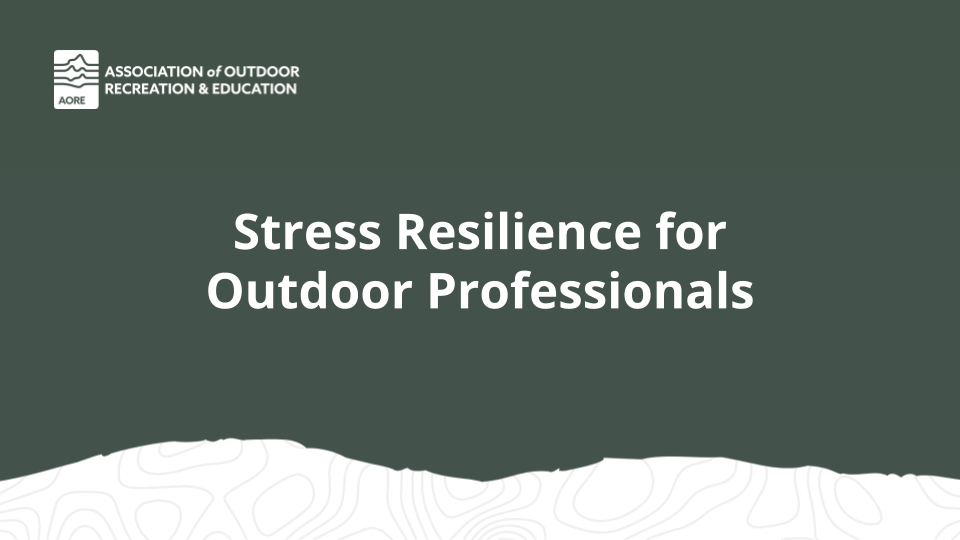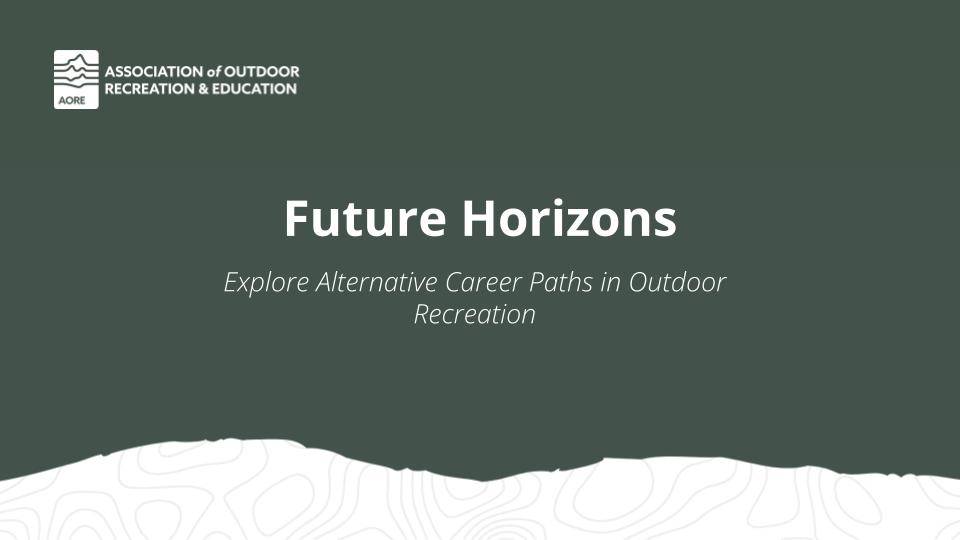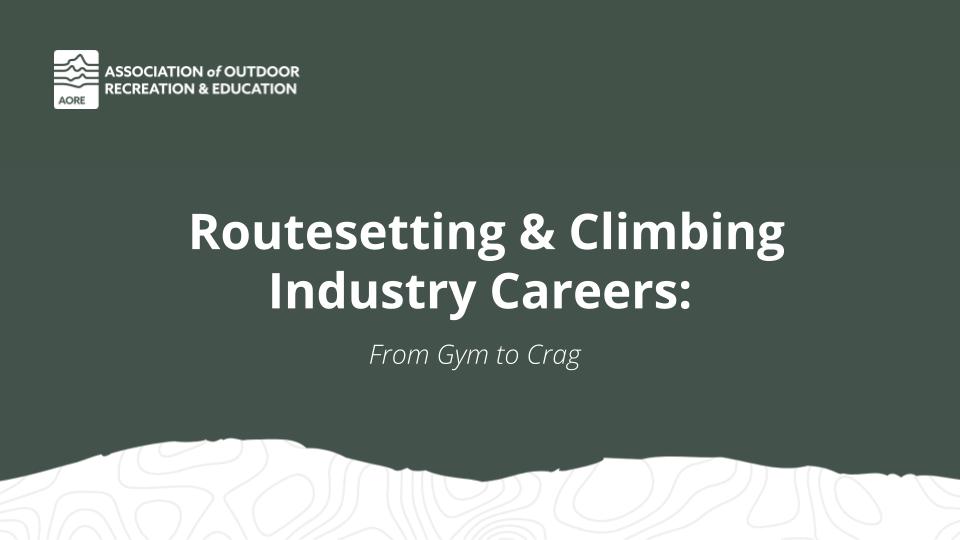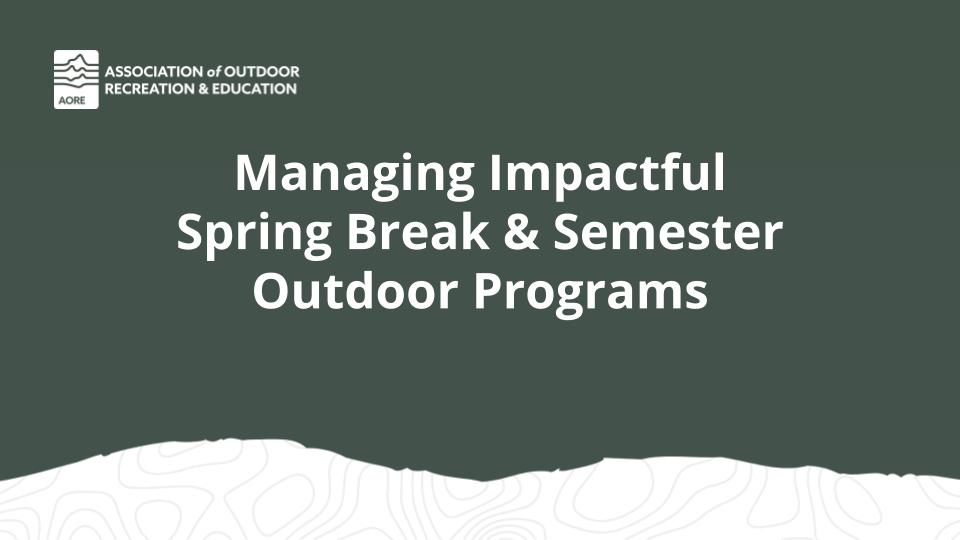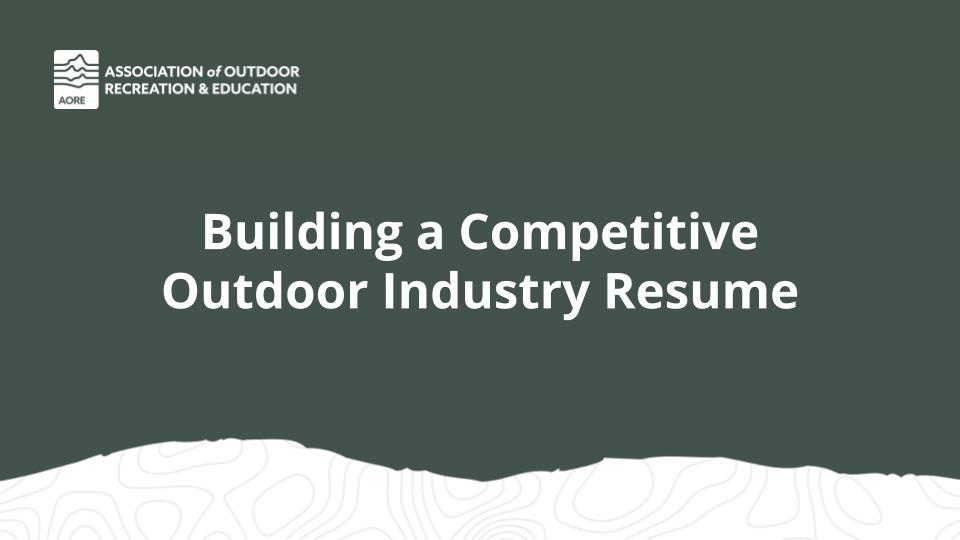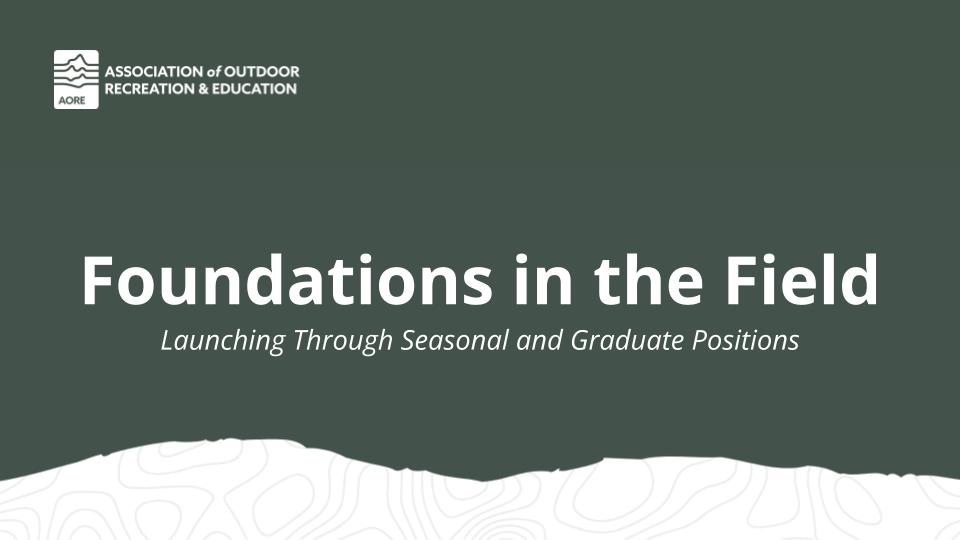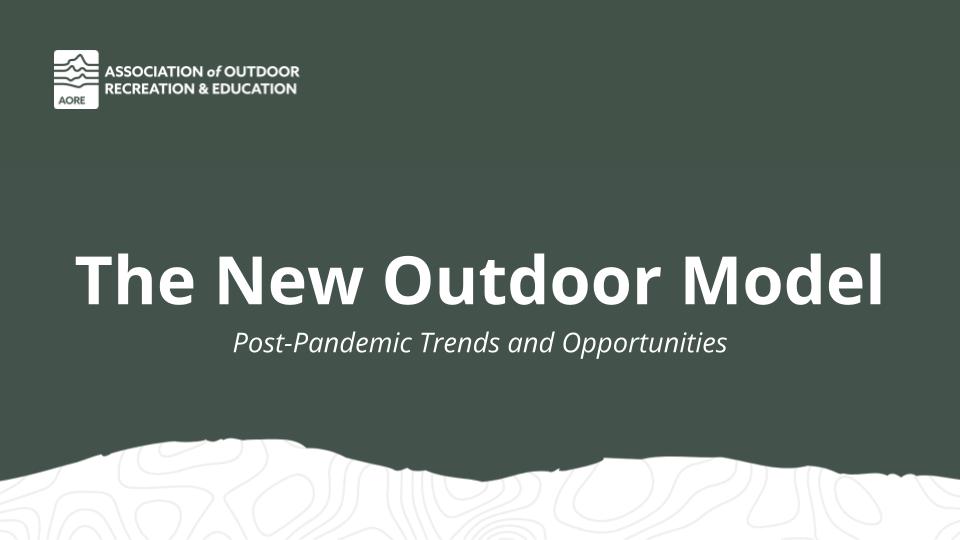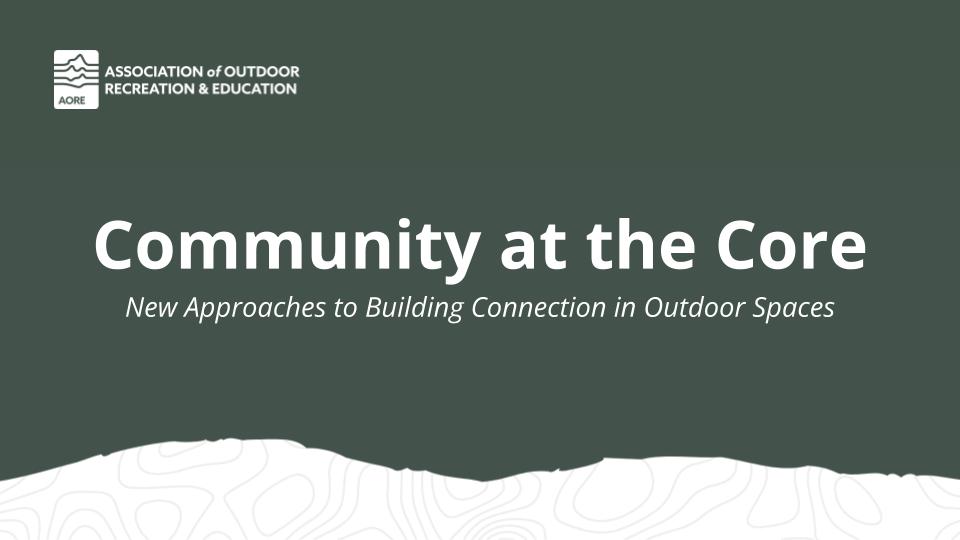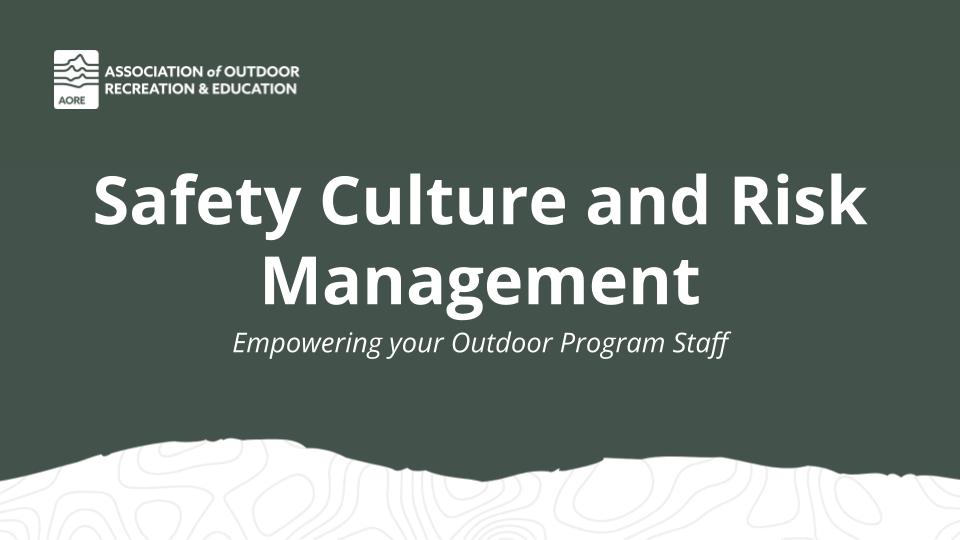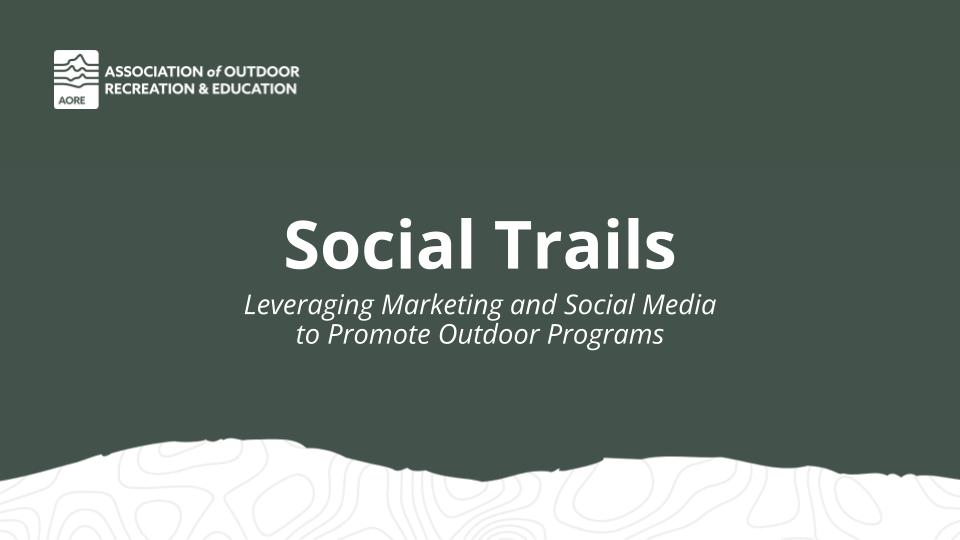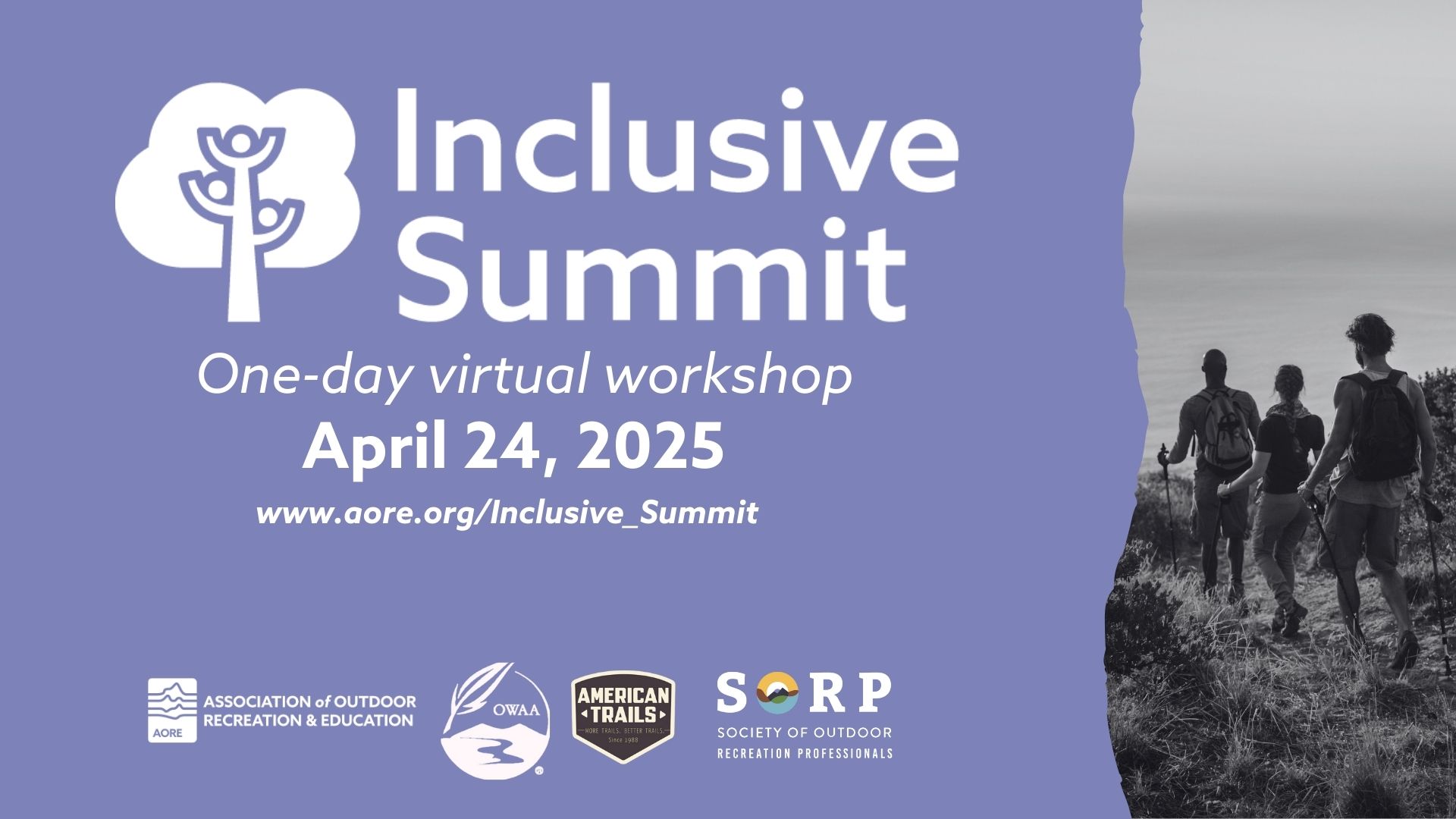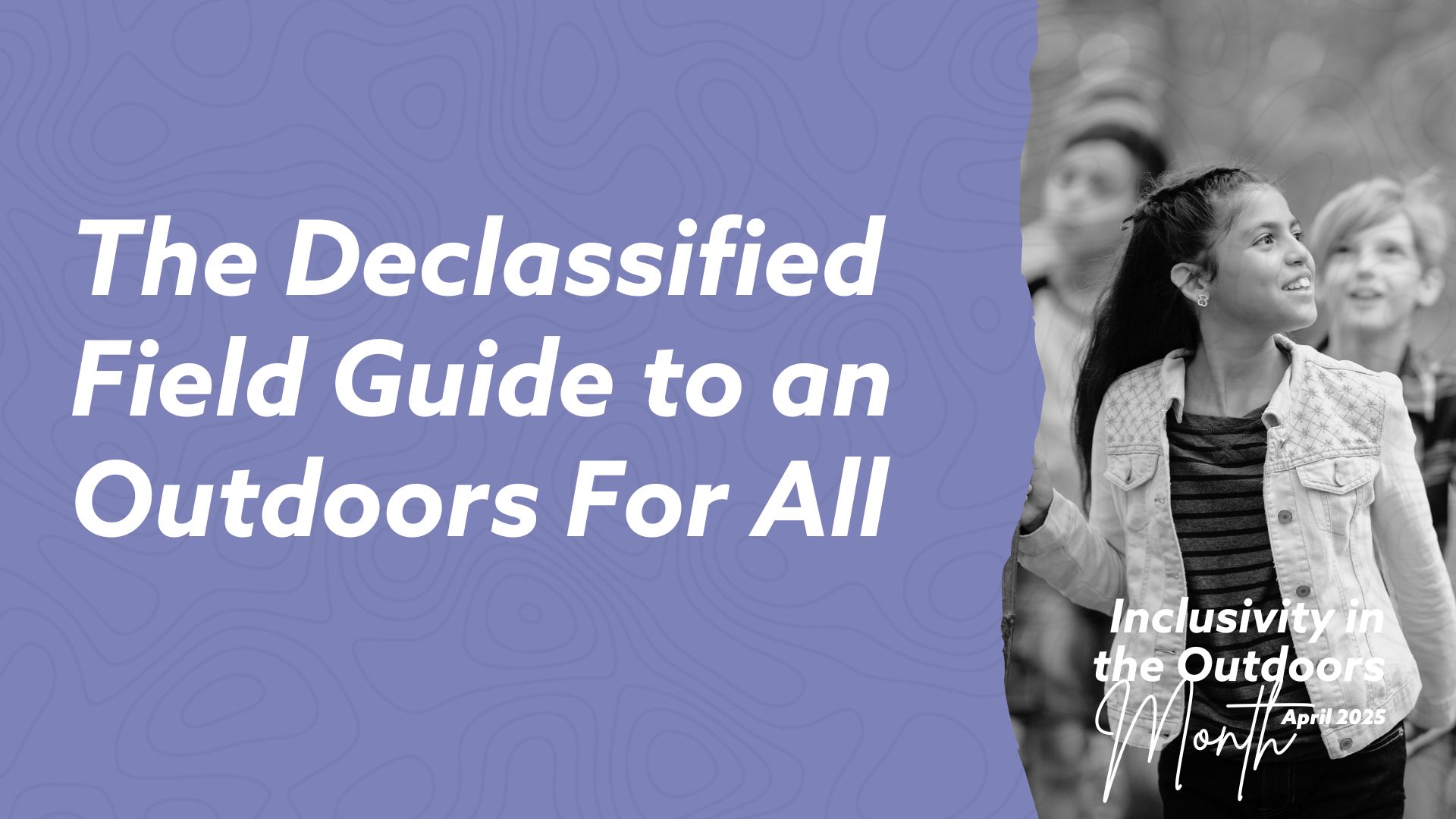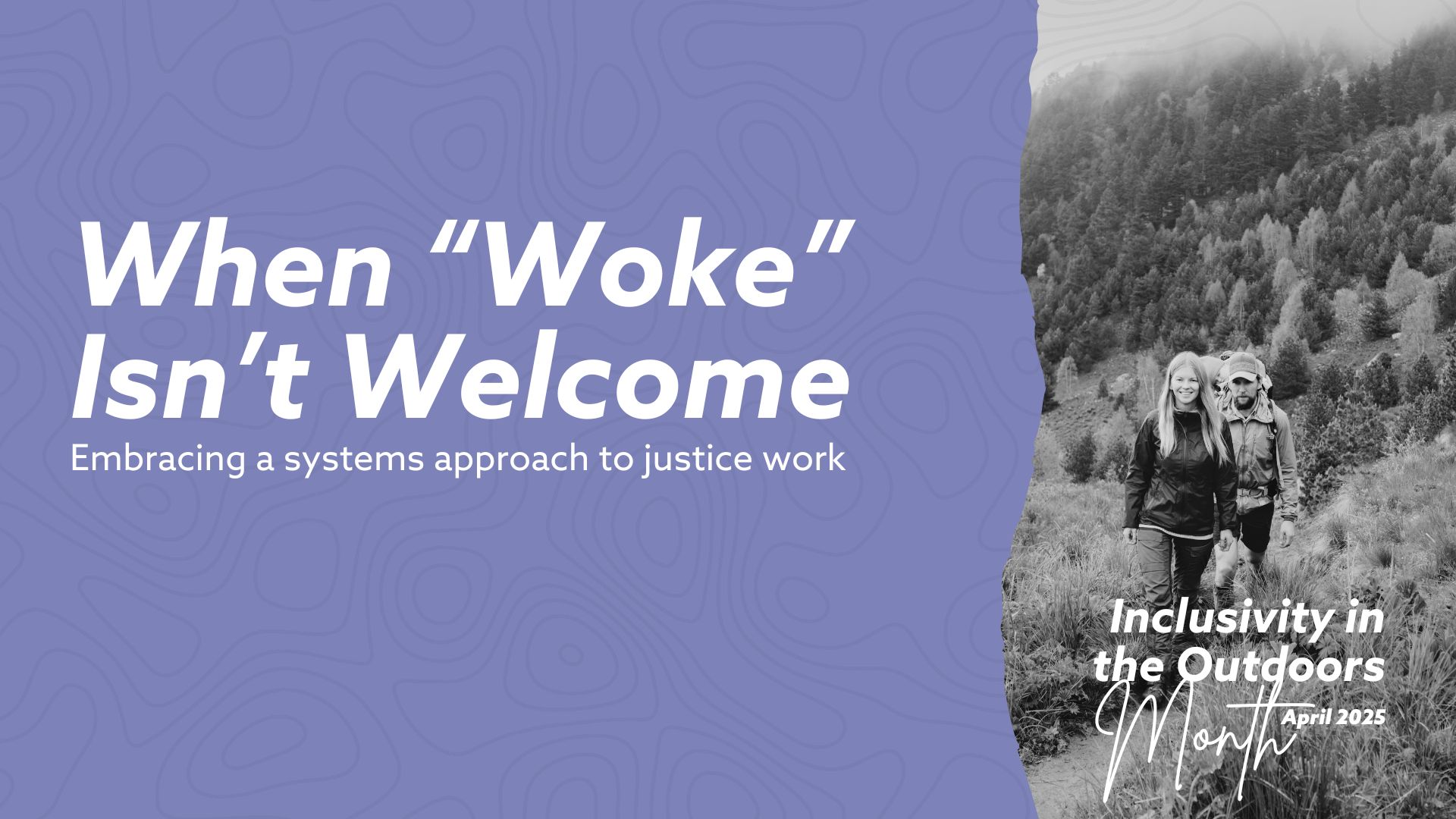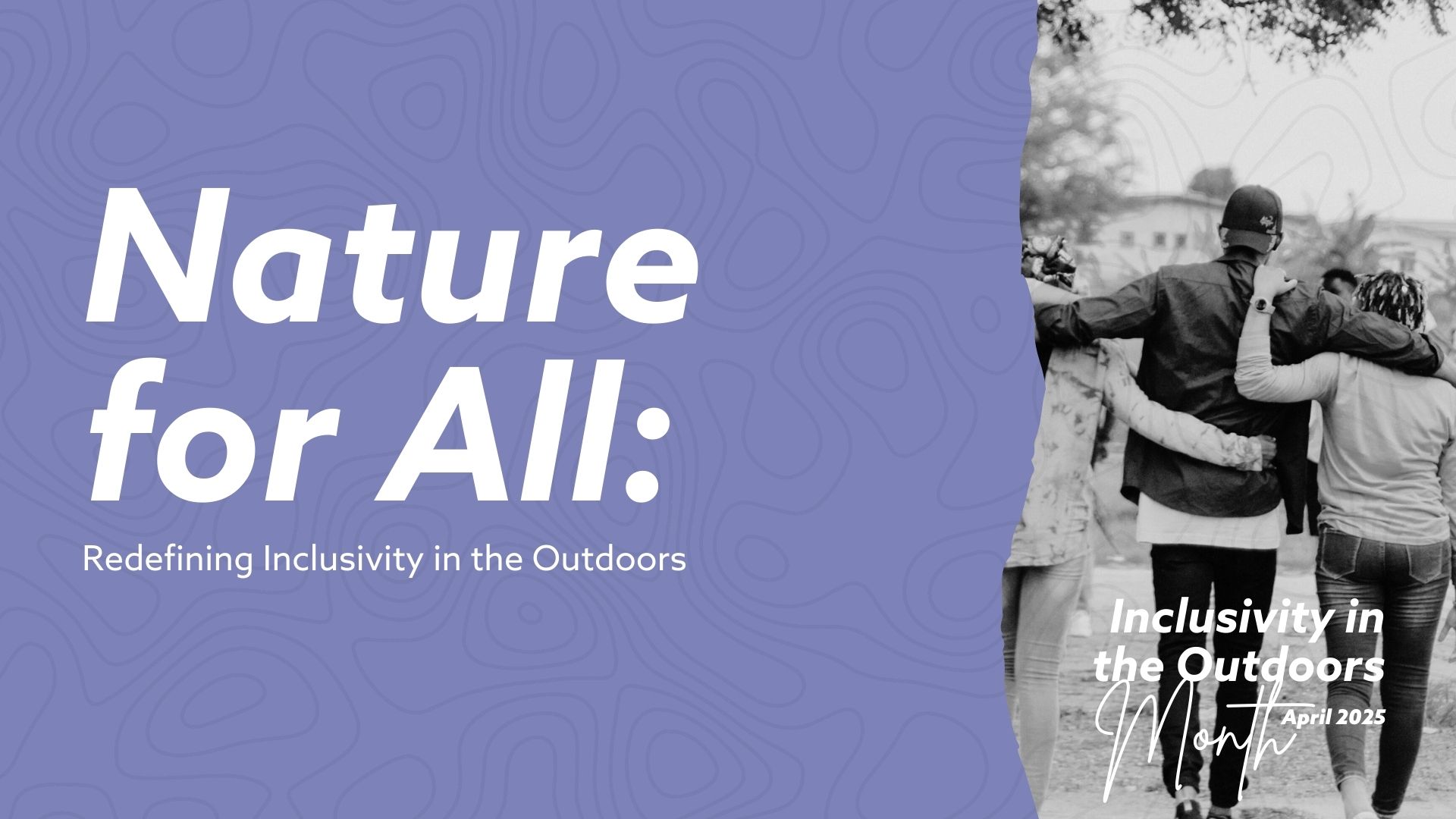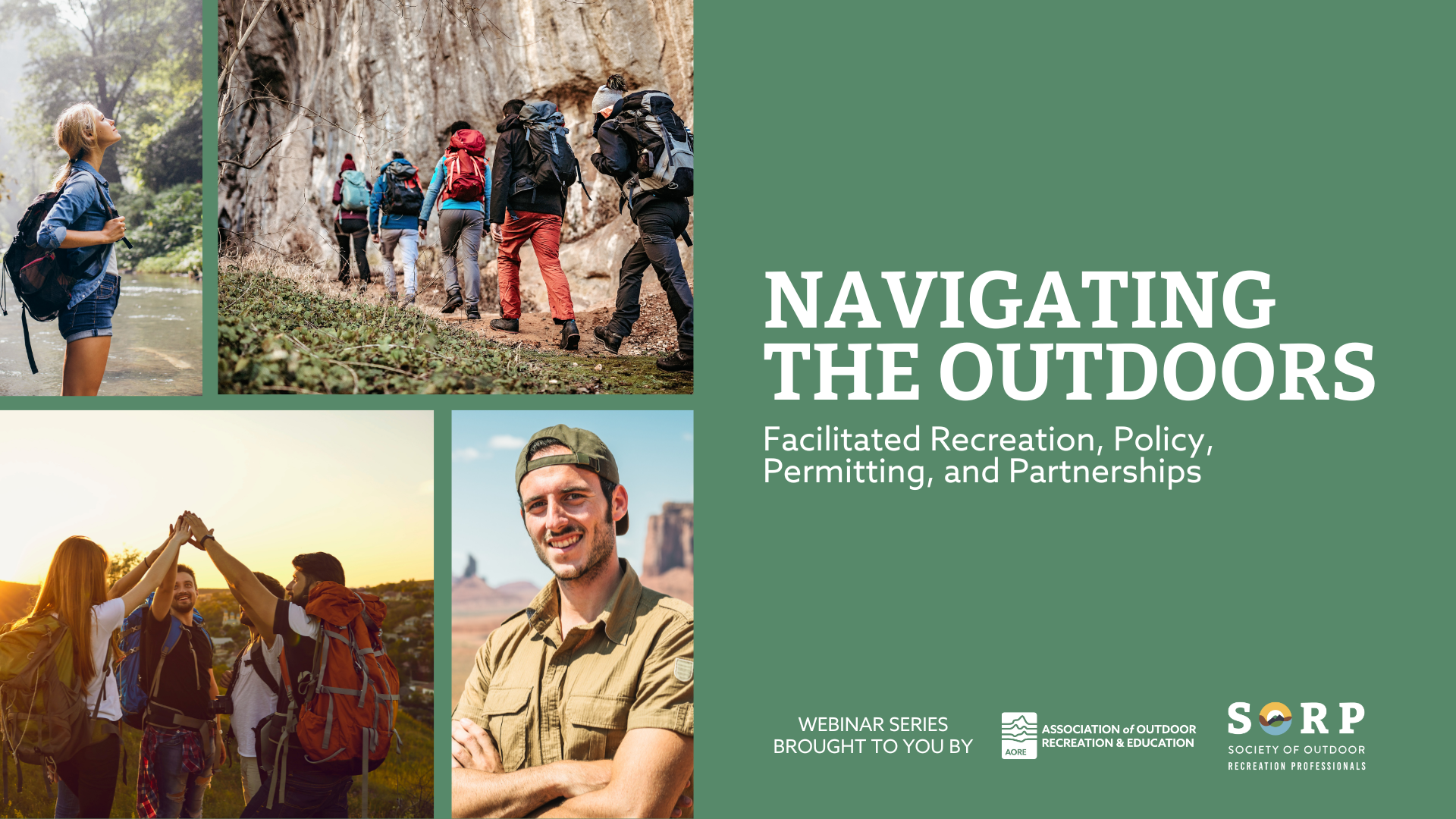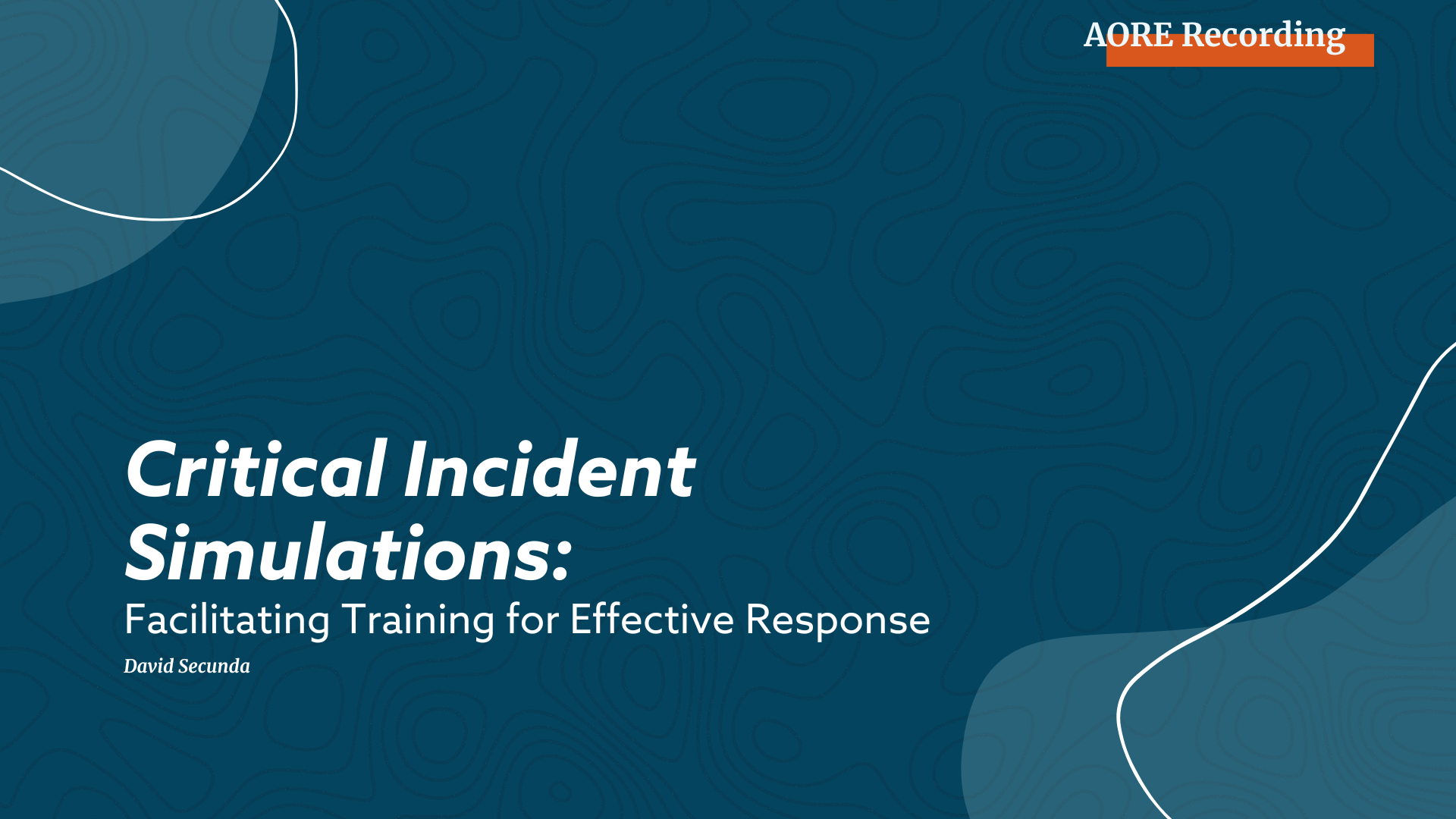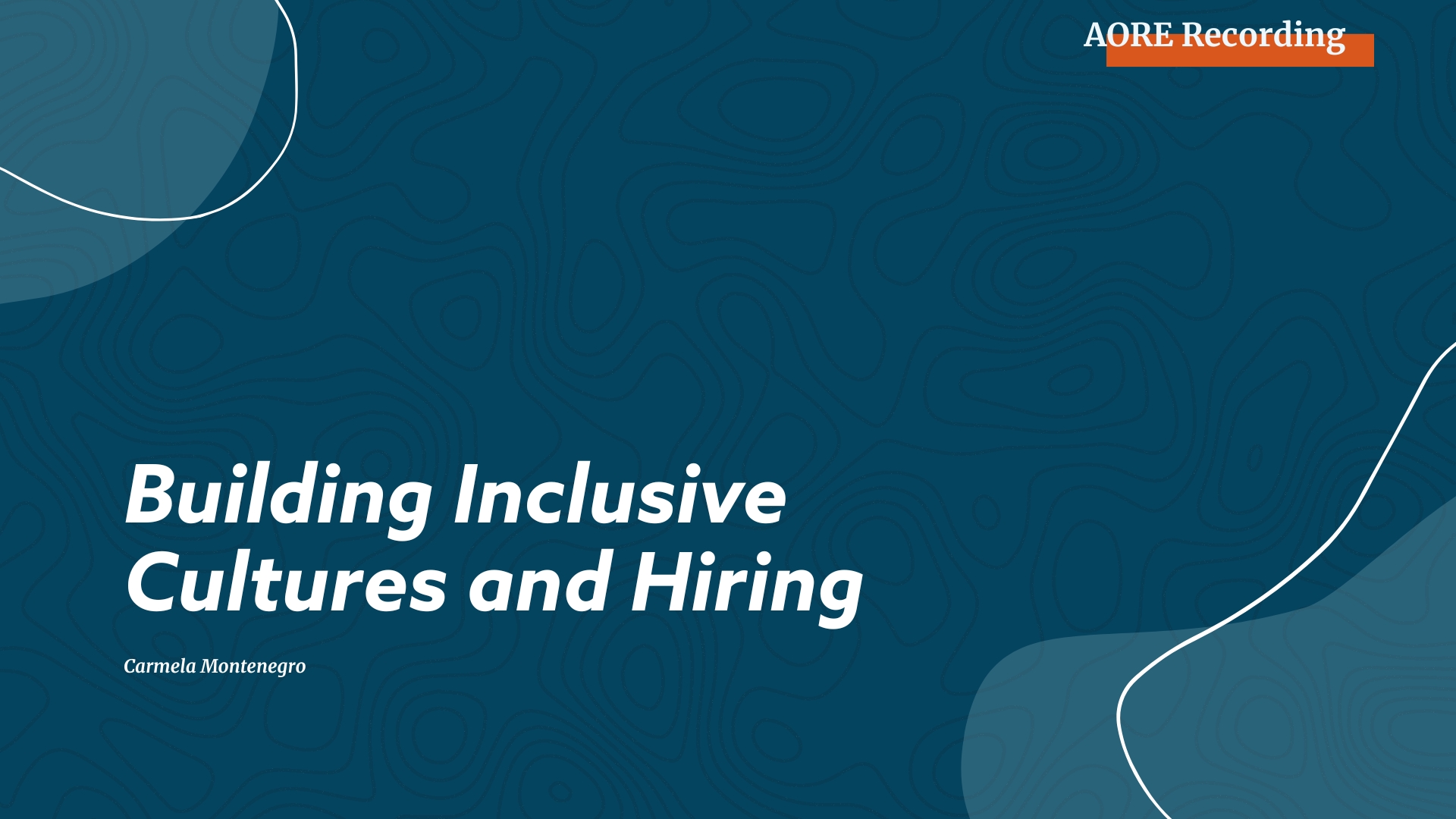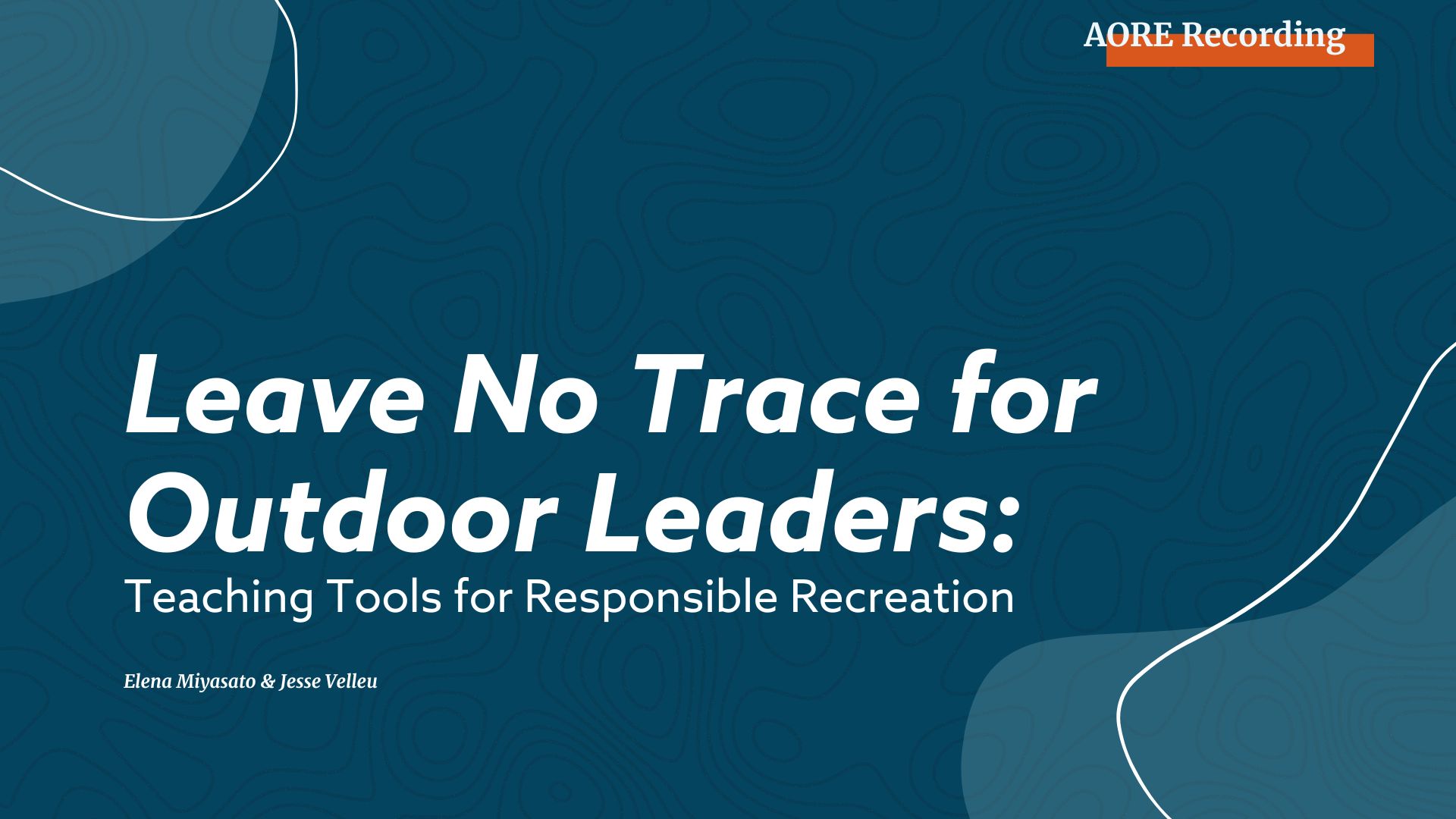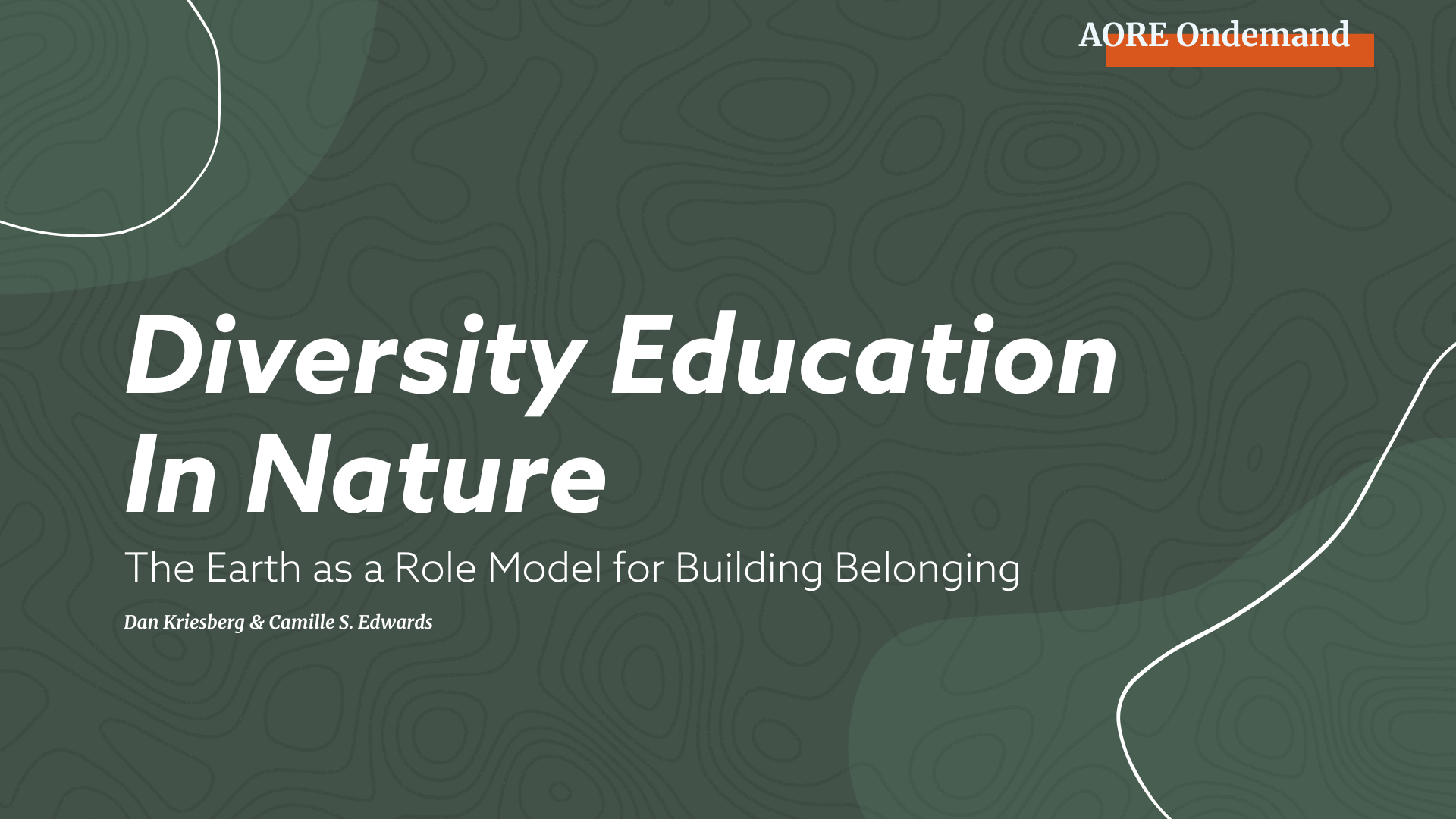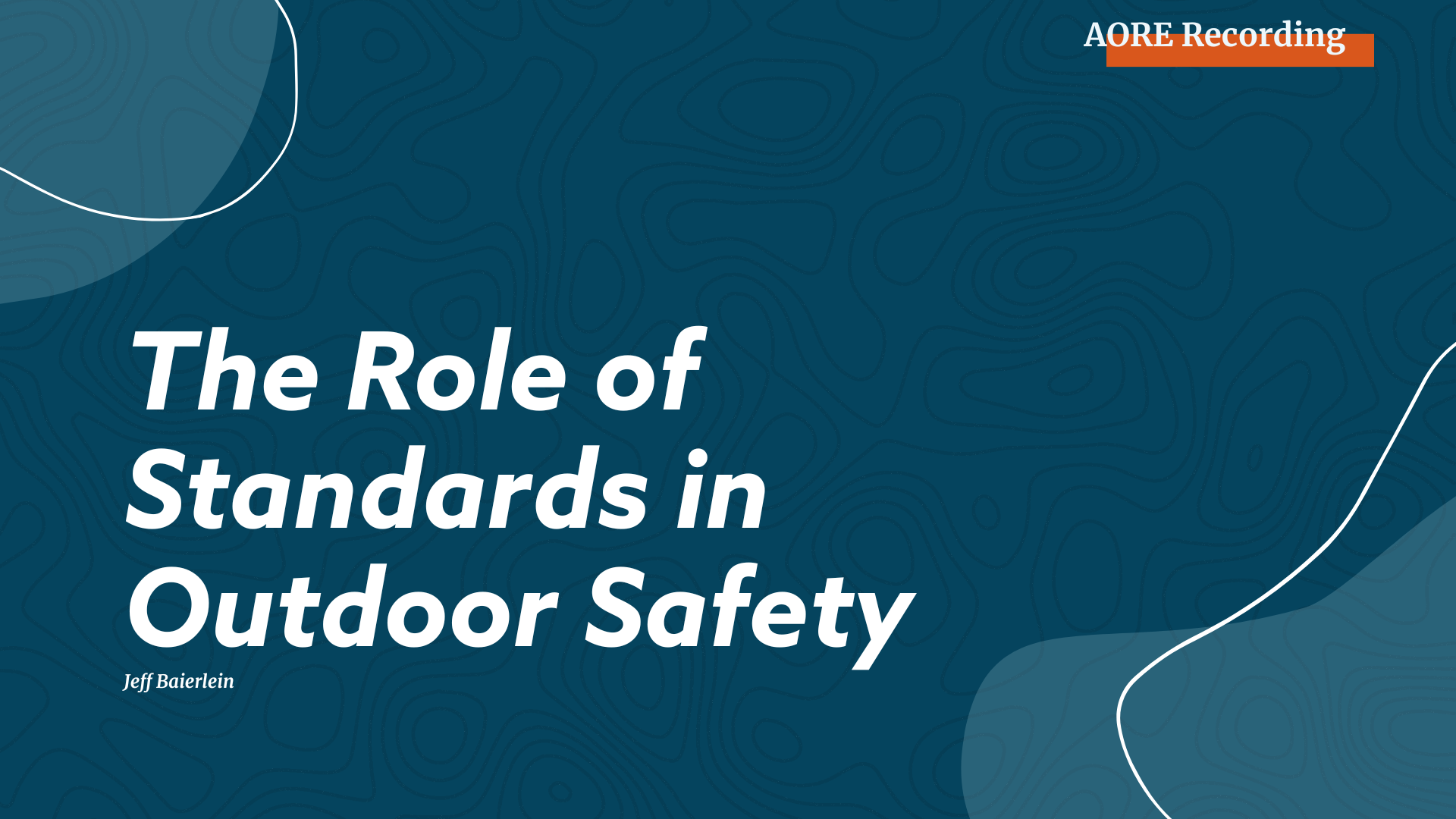AORE On Demand Education Content
The Association of Outdoor Recreation and Education (AORE) is the leading organization in the United States dedicated to serving the needs of outdoor recreation professionals and facilitators. We work to provide valuable content to our members through our benefits, including virtual education and professional development. Below are recording our education offering from 2024. If you are looking for previous years, please log into your member portal for access.
Risk Management Roundtable: Extreme Weather Changes and Policy
Presenter: Dr. Hailey Hester
Weather patterns have been changing over the past decade, and the increase of fires, flooding, and hurricanes are impacting programs. This roundtable is made to share thoughts, resources, and policies associated to risk management and program planning, as well as a place to discuss new changes programs may have made in response to these shifts in weather patterns.
FREE ACCESS
Watch NowStress Resilience for Outdoor Professionals
Presenter: Josie McKee
Outdoor excursions carry the risk of incidents and near misses that have the potential to be traumatic both to field staff and participants. We recommend staff training and organizational planning to manage the risk of stress injury.
This webinar will introduce a share language for stress injury, with the goal of helping outdoor professionals identify the risks and manage the impact of stress exposures. We will cover how stress injuries are formed and discuss the importance of including structured support for stress exposure within organizational risk management plans.
Access is FREE for registered attendees of the live event and members. Recording is $10 for not yet members.
Watch NowFuture Horizons: Explore Alternative Career Paths in Outdoor Recreation
Presenter: Dakota Anderson and Eboni Preston
Discover diverse outdoor careers beyond traditional guiding and facilitated recreation. This session will highlight opportunities in federal agencies, conservation, outdoor program administration, and other industry roles.
Access is FREE for registered attendees of the live event and members. Recording is $10 for not yet members.
Watch Now Routesetting & Climbing Industry Careers: From Gym to Crag
Presenter: Emery Carlson
Learn about the connections between climbing and philosophy through the particular lens of routesetting and the increasingly independent world of indoor climbing. Understand how bias affects climbing grades and what we can do to address it.
Access is FREE for registered attendees of the live event and members. Recording is $10 for not yet members.
Watch NowManaging Impactful Spring Break & Semester Outdoor Programs
Presenters: Emily Philpott, Christina Spohn
Discover how to design and lead outdoor programs during spring break and May semesters that balance adventure, education, and professional development for students.
Access is FREE for registered attendees of the live event and members. Recording is $10 for not yet members.
Watch NowBuilding a Competitive Outdoor Industry Resume
Presenters: Dustin Smucker, Augustine Donovan
Not all outdoor careers require a long list of certifications—so what does it take to stand out? This session will help job seekers identify which credentials truly matter, how to showcase transferable skills, and how to craft a resume that highlights experience, leadership, and industry-relevant expertise. Whether you’re applying for guiding jobs, outdoor education roles, or administrative positions in the industry, this session will provide insights into what employers are really looking for.
*Technical difficulties, partial recording available! Full presentation slides available
Access is FREE for registered attendees of the live event and members. Recording is $10 for not yet members.
Watch NowFoundations in the Field: Launching Through Seasonal and Graduate Positions
Presenters: Audrey Krimm and Zach Eigenbrodt
Kick off your career in outdoor recreation and education with insight into two of the most accessible and impactful entry points: seasonal roles and graduate positions. This session will explore the pros and cons of seasonal jobs, strategies for finding work across different times of the year, and how to leverage these experiences for long-term growth. You’ll also learn about graduate-level roles — what they entail, where to find them, and how they can set you up for success in this field. Whether you’re just starting out or looking to level up, this session will help you chart a clear path forward.
Access is FREE for registered attendees of the live event and members. Recording is $10 for not yet members.
Watch NowThe New Outdoor Model: Post-Pandemic Trends and Opportunities
Presenters: Brad Garmon and Kelly Davis
Data on outdoor “is painting a picture of a consumer base in transition,” according to Kelly Ann Davis, head of research for the Outdoor Industry Association and Outdoor Foundation. Join Kelly and Brad Garmon, Senior Strategic Advisor & Executive Director of the Michigan Outdoor Recreation Industry Office, to talk about the changing demographics in the outdoor space, including the changing face of “core outdoor” enthusiasts, the rise of the “casual” consumer, and opportunities to connect more people to outdoor careers and create experiences that offer mental and physical health to a broader cross section of the recreating public.
Access is FREE for registered attendees of the live event and members. Recording is $10 for not yet members.
Watch NowCommunity at the Core: New Approaches to Building Connection in Outdoor Spaces
Presenters: Steve Sassaman and Courtney Shultz
Building strong, inclusive outdoor communities doesn’t have to start in the backcountry. From college campuses to local parks, there are countless opportunities to foster meaningful connections in non-traditional outdoor spaces. In this highly interactive session, participants will join two innovative speakers in a live “design lab” to collectively reimagine what connection can look like in outdoor spaces. Drawing from real-world examples and community wisdom, attendees will co-create innovative strategies for creating welcoming outdoor experiences that engage diverse participants, encourage long-term involvement, and strengthen social bonds.
Join Steve Sassaman (Arizona State University) and Courtney Schultz, PhD (Health & Technology Partners) as they share creative approaches to community-building, including programming ideas, partnership opportunities, and engagement tactics designed for urban and campus-based outdoor recreation. Whether you're looking to revamp your existing programs or start fresh, this session will provide inspiration and practical tools to help you cultivate connection in the outdoors—wherever that may be.
Access is FREE for registered attendees of the live event and members. Recording is $10 for not yet members.
Watch NowSafety Culture and Risk Management: Empowering your Outdoor Program Staff
Presenter: Annie Linhart
Managing risk is the backbone of any successful outdoor program, and it starts with the people who lead and support it—your staff. This workshop will focus on how to implement a healthy safety culture at your program to equip your leaders, instructors, and staff with the skills, knowledge, and support they need so that risk management is prioritized and understood by all.
In this workshop, we’ll cover:
What safety culture is and how it impacts your organization’s risk management
Steps you can take to develop and maintain a healthy safety culture at your program
The importance of a supportive environment where staff can openly discuss safety issues without fear of judgment or reprisal
Access is FREE for registered attendees of the live event and members. Recording is $10 for not yet members.
Watch NowSocial Trails: Leveraging Marketing and Social Media to Promote Outdoor Programs
Guests: Miles Ramsay, Adrienne (Band) Maxwell, Anaëlle Wagoner, and Em Dahlgren
Check out the roundtable discussion exploring effective marketing strategies for outdoor programs. This session will spotlight social media engagement and digital outreach, featuring expert insights from Em Dahlgren, University of Central Florida, Anaëlle Wagoner, James Madison University’s UREC, Miles Ramsay, 52Eighty Creative, and Adrienne Band Maxwell, AORE’s Social Media Coordinator and Senior Account Executive at The Hodges Partnership.
This roundtable format invites participants to share what has worked, what hasn’t, and to ask questions about their own marketing challenges. Whether you’re new to outdoor program promotion or looking to refine your digital presence, this collaborative session is designed to provide actionable strategies and foster creative exchange.
Access is FREE for registered attendees of the live event and members. Recording is $10 for not yet members.
Watch NowInclusivity In the Outdoors
2025 Inclusive Summit
These workshops, recorded in April 24, 2025, is part of the 2025 Inclusivity in the Outdoors Month.
Presenter: Micah Leinbach, Elliot Drake-Maurer, and Elizabeth Allen
Our Inclusivity in the Outdoors month culminates with our LIVE workshops during the Inclusive Summit. Attendees got the oppostunity to dive deeper into these themes and put ideas into action. Help us reimagine what inclusivity in the outdoors truly means and take steps toward lasting change.
The Inclusive Summit recording provides access to our workbook, resources, Welcome + Workbook review session, and three workshops.
Learning credits are available for up to two years after the webinar. Each individual session will have a section after the video with access to a survey and quiz to earn credits. (Not valid after 4/2027)
Access is FREE for registered attendees of the live event. Recording is $75 for AORE members and $99 for not yet members.
Inclusivity In the Outdoors
The Declassified Field Guide to an Outdoors For All
This session, recorded in April 17, 2025, is part of the 2025 Inclusivity in the Outdoors Month.
Presenter: Roberto Morales
This session focuses on the bipartisan strategies necessary to advance an Outdoors For All framework. It delves into how advocates can create inclusive messaging, build coalitions across political lines, and frame outdoor access as a universal value. Participants will explore how to engage diverse stakeholders, including policymakers, community leaders, and organizations, to foster collaboration and advance equitable outdoor initiatives.
Learning credits are available for up to two years after the webinar. Each individual session will have a section after the video with access to a survey and quiz to earn credits. (Not valid after 4/2027)
This webinar is FREE for AORE members and registered attendees for the live session. $10 for not yet members.
Inclusivity In the Outdoors
When “Woke” Isn’t Welcome: Embracing a Systems Approach to Justice Work
This session, recorded in April 10, 2025, is part of the 2025 Inclusivity in the Outdoors Month.
Presenter: Micah Leinbach
Outdoor organizations are increasingly struggling to navigate how (and if!) to use phrases like “diversity,” “equity,” “inclusion,” and “woke.” Once innocuous words have become synonymous with certain politics, belief systems, and principles. As the idea of DEI increasingly comes under scrutiny, it’s a good opportunity to revisit their original meaning, how that meaning has evolved, and the principle at the center of all of them: “Justice.”
This workshop will focus on using a systems-approach to better shape an organizational justice strategy. We will spend some of the time on strategic program development, and some of the time on curricular and training tools that center the concept of justice. There are no easy answers, and even less uncertainty - gather with peers to explore how we can honor our values at the same time we honor the needs of our students, programs, and funders.
Learning credits are available for up to two years after the webinar. Each individual session will have a section after the video with access to a survey and quiz to earn credits. (Not valid after 4/2027)
This webinar is FREE for AORE members and registered attendees for the live session. $10 for not yet members.
Inclusivity In the Outdoors
Nature for All: Redefining Inclusivity in the Outdoors
This session, recorded in April 3, 2025, is part of the 2025 Inclusivity in the Outdoors Month.
Discover how we can break down barriers and inspire connection to nature for communities often left out of traditional outdoor spaces. This engaging panel features Courtney Schultz PhD (Bring it Outside program), Heather West (LOOP NOLA), and Joe Stone (Dovetail Trails Consulting), who will share their experiences and insights on empowering marginalized communities, including young kids, adaptive programming, rural and urban residents, Latine, immigrant, refugee, and BIPOC families.
Explore how outdoor engagement doesn’t always mean epic hikes or far-flung adventures—sometimes, it starts with a simple visit through a neighborhood park. Join us to learn how we can redefine what it means to enjoy the outdoors and make nature accessible for all.
Learning credits are available for up to two years after the webinar. Each individual session will have a section after the video with access to a survey and quiz to earn credits. (Not valid after 4/2027)
This webinar is FREE for AORE members and registered attendees for the live session. $10 for not yet members.
Navigating the Outdoors: Facilitated Recreation, Policy, Permitting, and Partnerships
This webinar series, recorded in January and February of 2025, is through a partnership with The Society of Outdoor Recreation Professionals (SORP).
This four-part series delves into facilitated recreation and its evolving role in public land access, visitor experience, and outdoor partnerships. Explore successful collaboration models between outdoor facilitators and land management agencies that enhance stewardship and visitor experiences. Sessions will feature insights from agency leaders, guides, policy experts, and organizations shaping outdoor recreation.
Key topics include addressing challenges like career accessibility in outdoor facilitation, innovative strategies to mitigate crowding, and improving facilitator-agency relationships amid staff shortages. The series will conclude with a policy-focused session examining permitting challenges, reforms for sustainable access, and strategies for equitable outdoor management.
Learning credits are available for up to two years after the webinar. Each individual session will have a section after the video with access to a survey and quiz to earn credits. (Not valid after 2/2027)
This series is FREE for all for the first 6 months.
After July 2025 the series will be free for members and $25 for not yet members.
Unless otherwise noted, access to on demand videos from 2024 and before
are FREE for members and $10 per video for not yet members.
Critical Incident Simulations: Facilitating Training for Effective Response
We already know that practice and role plays make for highly effective training for outdoor educators. Critical Incident practices are no exception and can provide a lived-experience foundation to respond to difficult situations as they occur in the field. In this session, you will learn how to facilitate your own Critical Incident Simulation, including assessment of training needs, crafting of a scenario to actualize learning objectives, logistic organization and outreach, coordination with outside agencies, social media simulation, and debriefing. Examples of actual simulations will be presented and a review of incident command structure will be discussed.
Building Inclusive Cultures and Hiring
Are your best practices "best" for everyone? Sometimes, core policies can be harmful for individuals. Most people believe that diversity and inclusion work can force people to be marginalized. In this workshop, we'll talk about the "Eight Inclusion Needs of All People." We can understand and read policies that can improve cultures and retention across all organizations.
The Science Behind Leave No Trace
Leave No Trace is grounded in science and research and has been since its origins in the field of recreation ecology. This has evolved over the years as recreation-related impacts and associated monitoring has incorporated human dimensions of natural resources, striving to understand how and why humans cause impacts and, ultimately, how to influence behaviors to decrease recreational-related impacts. Leave No Trace continues to inform educational programming through research, and this talk highlights recent studies and associated implications for educating outdoor recreationists.
Understanding Stress & Using Nature for Stress Management
Discover how to distinguish between toxic stress and resilience-building stress. The session will also explore effective strategies to manage stress using the outdoors and local surroundings. Participants will walk-away with further understanding of lifelong stress and strategies to transform stress to enhance well-being through practical, nature-based solutions.
Leave No Trace for Outdoor Leaders: Teaching Tools for Responsible Recreation
The Subaru/Leave No Trace Teams provide proven, research-based skills and education for getting outside in an environmentally sustainable way.
Diversity Education In Nature, The Earth as a Role Model for Building Belonging
The Diversity Education In Nature (DEIN) program uses outdoor education as a classroom for teaching how to build more equitable and inclusive human ecosystems through the design principle of biomimicry. First, the program uses the outdoors to build the skills of attentiveness, pattern-seeking, wondering, and creativity which helps to increase DEIB in all communities.
The Role of Standards in Outdoor Safety
How safe is safe enough? How do we know if our risk management practices are adequate? Who gets to decide? Answering these questions is where standards in outdoor safety come in.
